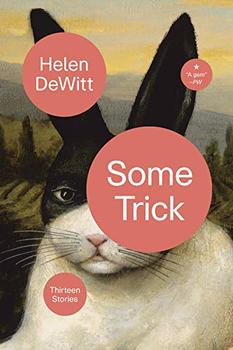Summary | Excerpt | Reviews | Beyond the Book | Read-Alikes | Genres & Themes | Author Bio

Critics' Opinion:
Readers' Opinion:
First Published:
May 2018, 224 pages
Paperback:
Oct 2019, 208 pages
 Book Reviewed by:
Book Reviewed by:
Lisa Butts
Buy This Book
This article relates to Some Trick
In DeWitt's story "Famous Last Words," two characters argue over the interpretation of an essay by Roland Barthes called "The Death of the Author," and whether its message is still relevant for writers.
Roland Barthes was a French philosopher and literary critic. He was born in 1915 in Cherbourg, France and attended the Sorbonne where he studied literature, linguistics, and Greek tragedy. He went on to become a respected professor, teaching at the French Institute in Bucharest, the University of Alexandria in Egypt, and Johns Hopkins University in Baltimore, among others. He was also a celebrated author, penning texts on topics ranging from love to art to semiotics (the study of signs and meaning).
Some of Barthes' most influential texts include A Lover's Discourse, Mythologies, and the essay "The Death of the Author."
"The Death of the Author" was first published in 1967 in American and French literary journals, and gained widespread popularity among students participating in the 1968 student demonstrations in Paris, in which young people protested conservative and capitalist social and economic policies. The demonstrations allowed for widespread dispersal of radical ideas like Barthes'.
Its central thesis is that a reader should put aside all knowledge of an individual author's life and biography while reading a text so that this information does not taint their interpretation. In other words, biographical information should not be regarded as useful context for an author's output. Barthes says: "The explanation of a work is always sought in the man or woman that produced it, as if it were always in the end, through more or less transparent allegory of fiction, the voice of a single person, the author 'confiding' in us." He notes, for example, that Van Gogh's paintings are viewed through the prism of his history of mental illness, and that Baudelaire's poetry is seen as inseparable from his tortured life of doomed love affairs, addiction, and illness.
Barthes declares literature a space where "all identity is lost, beginning with the very identity of the body that writes." He goes on to say that, for the author, "there is no other time than that of the utterance, and every text is eternally written here and now." What he means by this is that context outside of the text itself should not be taken into account, all that is relevant is the words on the page. This is very unconventional, and it goes against how many people are taught to evaluate literature and art, which explains its popularity among radical thinkers shortly after its release. Likely there is some middle ground one can reach when reading – biography matters, but it isn't everything, or even the most important thing, depending on the text in question. It is apt for DeWitt to reference this essay in her collection, as many of her protagonists suffer from confusion or complications in their life relating to their status as authors or artists and their personal feelings about their art.
Barthes died in 1980 at the age of 64, succumbing to his injuries after being hit by a car.
Filed under Books and Authors
![]() This "beyond the book article" relates to Some Trick. It originally ran in May 2018 and has been updated for the
October 2019 paperback edition.
Go to magazine.
This "beyond the book article" relates to Some Trick. It originally ran in May 2018 and has been updated for the
October 2019 paperback edition.
Go to magazine.





The House on Biscayne Bay
by Chanel Cleeton
As death stalks a gothic mansion in Miami, the lives of two women intertwine as the past and present collide.

The Flower Sisters
by Michelle Collins Anderson
From the new Fannie Flagg of the Ozarks, a richly-woven story of family, forgiveness, and reinvention.

The Funeral Cryer by Wenyan Lu
Debut novelist Wenyan Lu brings us this witty yet profound story about one woman's midlife reawakening in contemporary rural China.
Your guide toexceptional books
BookBrowse seeks out and recommends the best in contemporary fiction and nonfiction—books that not only engage and entertain but also deepen our understanding of ourselves and the world around us.